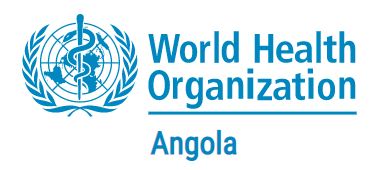Angola faces a generalized Human Immunodeficiency Virus (HIV) epidemic, with sexual transmission being key to its spread. According to the Demographic Health Indicators Survey (2015/16), the HIV prevalence rate in the general population 15-49 years is 2% and is higher amongst women.
The HIV epidemic is mostly concentrated in urban areas, with the highest prevalence and incidence in the Eastern and Southern provinces of the country partly influenced by the porous borders with the Democratic Republic of Congo, including Lunda Norte, Lunda Sul and Malanje.
According to UNAIDS (2022), around 310,000 people in Angola live with HIV/AIDS. However, antiretroviral treatment coverage is still insufficient, reaching only 49% of adults and 22% of children who need treatment.
As part of a wider initiative to accelerate and strengthen joint monitoring, technical support, and supervision visits during this current fiscal year, the National Institute of the Fight Against AIDS (INLS) initiated a series of HIV advocacy field visits in June 2024 to the provinces of Lunda Norte, Lunda Sul, and Malanje. Supported by UNAIDS, WHO, UNHCR, UNICEF, UNFPA, and Civil Society Organizations such as ACADEJ, ANASO, and MWENHO, these visits aim to strengthen HIV prevention and treatment actions amongst children and young people. Additionally, the initiative seeks to enhance the integration of primary care and Sexual and Reproductive Health services, as well as reduce gender-based violence.
According to the Director of INLS, Dr. Lúcia Furtado, chief of the HIV advocacy delegation, the creation of a multisectoral commission is essential to disseminate information about the virus, forms of transmission, prevention, and treatment. ”We’ve been working on spreading the word about the elimination of vertical transmission programme, to minimize the transmission of the virus from mother to child,” She added.
Despite the efforts made to date, it is important to note that there are still several challenges in the fight against HIV/AIDS. These include limited investment in community strategies that support health programs, social barriers that hinder adherence and continuity of diagnosis and treatment, and gaps in multisectoral actions to intensify HIV/AIDS prevention and treatment measures.
To mitigate these challenges and achieve key national and global targets, meetings were held with the Provincial Governors of Lunda Norte, Lunda Sul and Malanje, to discuss relevant data on the impact of HIV in their respective provinces highlighting the need for stronger political leadership for effective actions towards prevention, access to treatment and adherence support programs for people living with HIV.
In addition, meetings were held with the Provincial Health Directorate of the three provinces to assess the state of health services delivery and to identify, based on the 7th National HIV, STIs and Viral Hepatitis National Strategic Plan (NSP7), actions to acceleration in line with the priorities established in each of the provinces.
Furthermore, delegates visited the Kasai Refugee Settlement of Lôvua in Lunda Norte; the Provincial Maternal Hospital and the Maternal-child center in Lunda Sul and Malanje to understand the challenges and successes in implementing pediatric and mother-child HIV services.
Consultation and orientation sessions with local civil society organizations were also held in the three provinces. ”There is hope for us to change this scenario. We will continue to work together to prevent, test HIV and ensure that no one is left behind,” said Dr Yoti Zabulon, WHO Representative in Angola, during this occasion in Lunda Norte, expressing WHO’s renewed commitment to supporting the Government and health partners in the fight against HIV/AIDS and in promoting greater health for all people in Angola.
On the same occasion, the UNAIDS representative in Angola, Dr Hege Wagan stressed that global commitments do not exist without the people who do the work in the community. She continued “The global goals are there because we know we can achieve them if we work together. So here we are listening to how we can work better together, as the United Nations, Civil Society and Government.”
The HIV advocacy meetings will visit twelve additional provinces with HIV prevalence of 2% or higher to disseminate the NSP7 and contribute ideas towards decrease of new infections especially amongst children and young people.
Distributed by APO Group on behalf of World Health Organization (WHO) – Angola.

